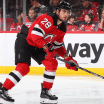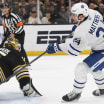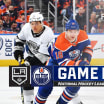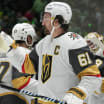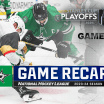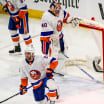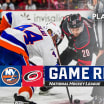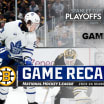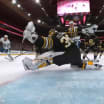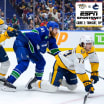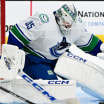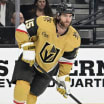Mailbag: Eakins' impact with Ducks, Trouba trade, Pavelski's future
NHL.com's Dan Rosen answers weekly questions
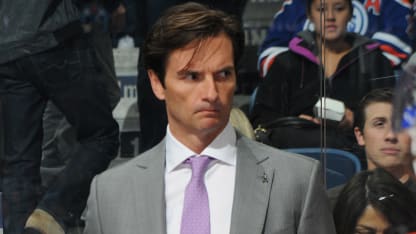
© Andy Devlin/Getty Images
How big of an impact can Dallas Eakins have as an NHL coach? What style of game can we expect from him and where do you see the Anaheim Ducks in the standings next season? -- @bonnetbeats
I expect Eakins will come back to the NHL as a better coach than when he left it four and a half years ago after getting fired by the Edmonton Oilers 31 games into the 2014-15 season. A lot of coaches who get humbled after getting fired from their first head coaching job in the NHL come back stronger and better for it. The best three recent examples I can give you right now are Craig Berube (St. Louis Blues), Bruce Cassidy (Boston Bruins) and Mike Sullivan (Pittsburgh Penguins). That's three of the past four Stanley Cup-winning coaches (Berube and Sullivan twice) and a Cup Final runner-up (Cassidy). I'm not suggesting Eakins will do the same immediately, but after four solid seasons coaching the Ducks' American Hockey League affiliate in San Diego, he should have more perspective and a better idea of how to have success in the NHL. He didn't have that when he went to Edmonton in 2013.
Eakins is a new age coach. The Ducks need that after going old school for so long with Randy Carlyle and Bruce Boudreu since 2005. Eakins should interact well with the players. That's a good step in today's NHL. Players want guidance and support. They want to know they're being heard too. Eakins knows the organization well and has coached a number of the players the Ducks will likely be relying on next season, including forwards Max Jones, Sam Steel,
Max Comtois
,
Kiefer Sherwood
, Ondrej Kase and Nick Ritchie, and defenseman Jacob Larsson. He needs to make the Ducks a more skilled and faster team. They can't lose their identity as being a physical, tough-to-play against team, but they must add speed to their game. They'll be in shape. Eakins is a physical fitness fiend. They'll work hard. Eakins and general manager Bob Murray will demand it. But I think expectations need to be low this season as the Ducks attempt to go through a transition from old school to new school. It's only fair to Eakins to give him time to mold the Ducks into the team he wants them to be.
What does the Jacob Trouba trade mean for the New York Rangers and their future? -- @TJRinger1
It enhances the Rangers' future in a meaningful way to acquire Trouba, a 25-year-old defenseman, from the Winnipeg Jets on Monday. The trade stays with the Rangers' ongoing efforts to rebuild their roster to create a young core that will give them their best chance to have sustained success, to push to be Stanley Cup contenders again. It's a slick, smart, aggressive move by general manager Jeff Gorton that makes sense on multiple levels provided they can get him signed to a long-term contract. Trouba can become a restricted free agent July 1.
The Rangers didn't sacrifice a big part of their future to get Trouba. They gave up 23-year-old defenseman Neal Pionk and the No. 20 pick in the 2019 NHL Draft. Trouba is a more impactful defenseman than Pionk. He plays in all situations and I expect him to play upwards of 24-25 minutes per game. Pionk thrives with fewer minutes and sheltered zone starts in the offensive zone. He's not an all-situations defenseman. The Rangers already have the No. 2 pick in the draft and the No. 20 pick is one they acquired from the Jets previously on Feb. 25 when they traded center Kevin Hayes to Winnipeg. All they did was give the pick back, which was made easier to do when they moved up from No. 6 to No. 2 in the 2019 NHL Draft Lottery.
The fact that Trouba is 25 and a righty are huge aspects of the trade. The Rangers wanted to upgrade their defense, particularly their right side, without straying from their model of building with younger players. Trouba is in the prime of his career coming off his best season (50 points in 82 games). If the Rangers get him signed to a seven- or eight-year contract, they should be getting Trouba's best years.
WPG@ARI: Trouba sweeps in goal at the doorstep
Does Joe Pavelski make sense in Colorado and would he want to go there? -- @Avsfan37
I can't answer the second part because I don't know what Pavelski is thinking, but if the San Jose Sharks let their captain become an unrestricted free agent July 1, the Colorado Avalanche certainly look like they'd be an appropriate fit for him as an up-and-coming team that would benefit from his leadership and his goal scoring. Pavelski scored 38 goals this season and could play center or wing for them and netfront on the power play. However, I wouldn't go longer than three years on a contract.
However, Pavelski's availability on the open market is still a big "if" even with defenseman Erik Karlsson's new eight-year contract. If he wants more than three years, my guess is that will be a turn off to Sharks general manager Doug Wilson, who cleared cap space to give him added flexibility by trading defenseman Justin Braun to the Philadelphia Flyers on Tuesday for a second-round pick in the 2019 draft and a third-round pick in the 2020 NHL Draft. Remember, Wilson made the shrewd decision to let long-time Sharks forward Patrick Marleau leave in the summer of 2017 because he didn't want to give him the third year on a new contract when he was two and a half months shy of his 38th birthday. The Toronto Maple Leafs gave Marleau the third year. He played the first two and now they're reportedly trying to trade him. Pavelski turns 35 on July 11.
The Sharks still have to try to re-sign forwards Timo Meier and Kevin Labanc, who are both pending restricted free agents, plus there is the looming decision with pending UFA center Joe Thornton. If Thornton wants to play another season, it will be in San Jose. So there's a cap crunch in San Jose, which means Pavelski could get squeezed out, especially since Wilson likely doesn't want to leave himself vulnerable to Meier or Labanc signing an offer sheet with another team. If he's squeezed out, Colorado could be a solid landing spot.
What is a good comparable for Ivan Provorov? -- @Zanderson7991
The comparable for the Philadelphia Flyers 22-year-old defenseman could change in the coming weeks if other pending RFA defenseman in his age group, most notably 21-year-olds Zach Werenksi of the Columbus Blue Jackets and Charlie McAvoy of the Boston Bruins, sign before Provorov. If they do, their contracts should give an indication as to the terms of what Provorov would get from the Flyers. Short of that, I think we can look back to Noah Hanifin's six-year, $29.7 million contract ($4.95 million cap charge) as a jumping off point for Provorov.
Hanifin, who was the No. 5 pick in the 2015 NHL Draft, signed his contract as a 21-year-old with three years of experience in the NHL. He had 83 points (18 goals, 65 assists) in 239 games with the Carolina Hurricanes, who traded him before he signed with the Calgary Flames. Provorov, the No. 7 pick in 2015, is 22 and has three years of experience with the Flyers. He has 97 points (30 goals, 67 assists) in 246 games and has not missed a game. But Hanifin signed his contract coming off the best of his first three seasons in the NHL. Provorov's game dipped this season, as did his production. He had 26 points (seven goals, 19 assists), a drop of 15 points, including 10 goals, from 2017-18. The Flyers might be able to gain some leverage in contract talks because of Provorov's down season, but they should look at it as a one-off. They should expect him to get back to being a potential 20-goal, 50-point defenseman who can play 22-plus minutes per game. He is still young. He's not a finished product. Last season was tough for the Flyers with a coaching change from Dave Hakstol to Scott Gordon and the GM change from Ron Hextall to Chuck Fletcher. A fresh start under coach Alain Vigneault could help Provorov's game take off again.
Day 1 next season, is Phil Kessel still a Pittsburgh Penguin? -- @dan_staffen
I still keep coming back to the opinion that Kessel will be traded before next season begins. Penguins general manager Jim Rutherford confirmed on 93.7 The Fan in Pittsburgh on Monday that Kessel recently exercised the rights associated with the limited no-trade clause in his contract to veto a trade. Rutherford also said he's operating under the assumption that Kessel will be with the Penguins unless he gets an offer that he has to seriously consider. Rutherford clearly thinks he can use Kessel as a vehicle to re-tool the Penguins roster so I have to believe he'd still be in the market to trade him. I also wonder if the fact that Kessel had to veto a trade puts a strain on the relationship between the player and the team, and if it could quickly become problematic if Kessel remains. Kessel is still an impact player and should be sought after, but I think Rutherford will try to act at some point this offesason or in training camp to trade him.
---
Listen: NHL Fantasy on Ice podcast


